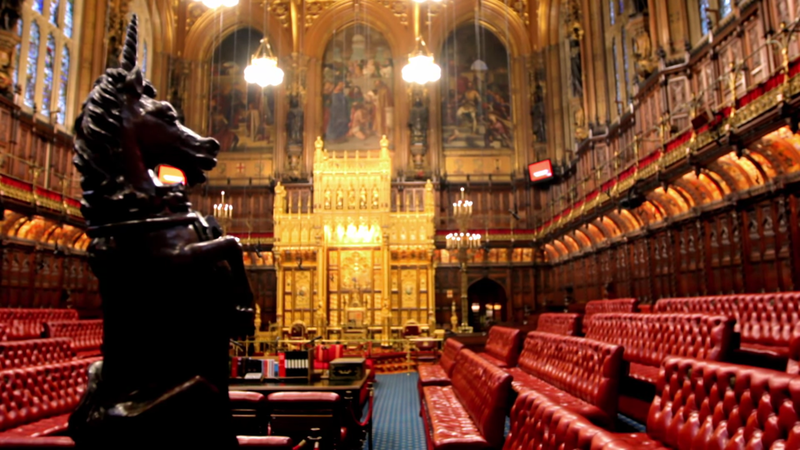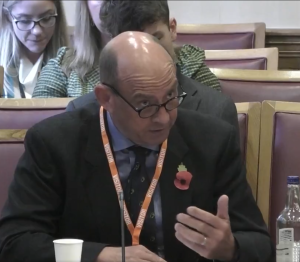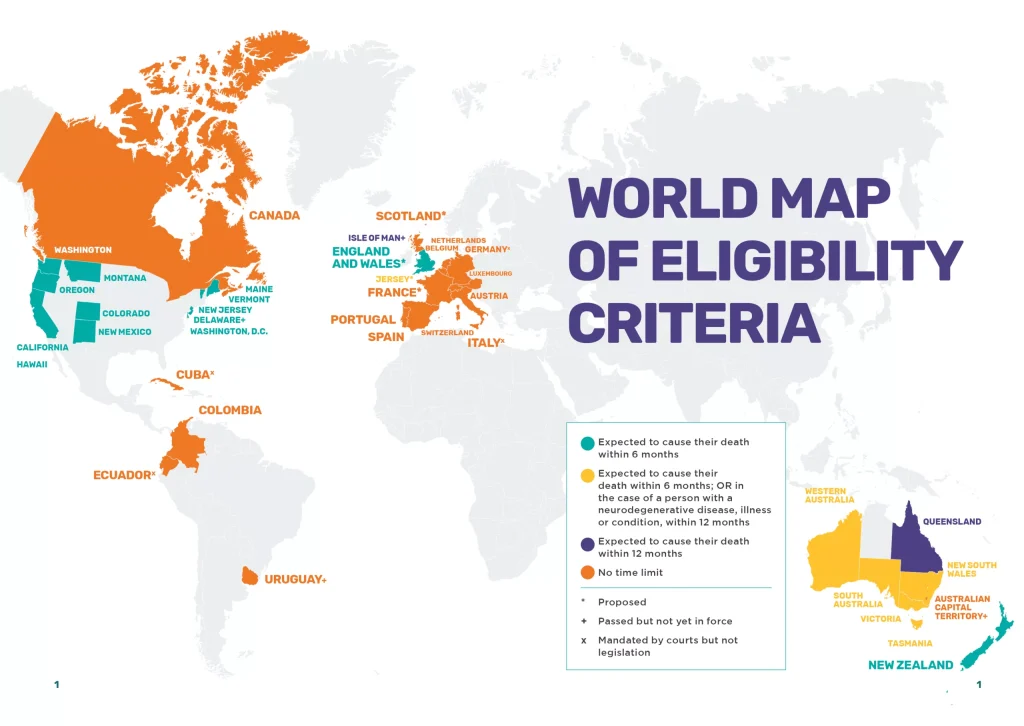
This article was updated on 11 November 2025 to better reflect the British Medical Association’s neutral position.
The House of Lords Select Committee on the Terminally Ill Adults (End of Life Bill) held their third day of oral evidence, during which it heard from a range of palliative and elderly care professionals. This session further added to the wealth of evidence gathered by Parliament in its scrutiny of the Bill. Nevertheless, My Death, My Decision and Humanists UK have raised concerns about the potential bias of the Committee and the selection of those called to give evidence, which does not include those who are terminally ill or with personal experiences.
First session: Palliative care
Dr Suzanne Kite, President of the Association for Palliative Medicine, was asked about the international evidence that suggests that many people start the process for an assisted death without finishing it, and the process alone gives them comfort. Dr Kite replied:
‘I have read in the literature that it is a great source of comfort to know that it is possible. Relatives in Australia have told me that.’
The British Medical Association has a neutral position on assisted dying. Their briefing summarising key arguments says that an argument often used by supporters of a change in the law is that: ‘The existence of legislation allowing assisted dying brings reassurance and peace of mind for many people with terminal illness and their loved ones, even though only a small percentage actually use it when the time comes.’
 Toby Porter, CEO at Hospice UK, told the Committee:
Toby Porter, CEO at Hospice UK, told the Committee:
‘The debate on assisted dying has created more of a national conversation about death and dying than I have certainly seen in my time working in the hospice sector. And I think one of the questions for all of us in the UK is how can we broaden this very passionate, intensive, knowledgeable debate about what a cohort of people who may access an assisted death in the future to have larger conversations about death and dying in the UK which would lead to earlier referrals to hospices and palliative care services which would hopefully see a reduction in unnecessary intrusive traumatic treatments of people right at the end of their lives.’
Research from the Co-op Foundation showed that the debate has already helped 21 million Brits to talk more openly about a bereavement, with two-fifths (42%) saying that they now feel more comfortable talking about death.
Professor Sam Ahmedzai, Emeritus Professor of Supportive and Palliative Medicine at The University of Sheffield, told the Committee:
‘Places I have worked around the world and the colleagues I am in touch with have shown me that it is perfectly capable for assisted dying to come alongside [palliative care], and then become incorporated. There are places where hospices, palliative care services have absorbed assisted dying. Obviously, in small numbers compared to the general populations they serve. But it can work side by side.
‘In the UK, we have come very late to this, but again I can’t see any reason why assisted dying could start in maybe specialist units in hospitals and in some hospices, which are favourable. Also in nursing homes. A lot of assisted dying happens in nursing homes, for instance, in the Netherlands.’
Professor Katherine Sleeman, Laing Galazka Chair in Palliative Care at King’s College London, told the Committee:
‘We’ve just published some detailed modeling work that estimates that specialist palliative care not only reduces distressing death but has the potential to save the NHS significant amounts of money, so our estimates show about £8,000 for each person who dies at home would be saved if they receive special expensive care and about £6,500 for each person who dies in hospital would be saved.
‘Palliative care is a high-value intervention. It’s a rare thing in health and care. It improves outcomes for patients and carers, and it improves value for the system. It saves the system money overall, so absolutely. That is where we should be focusing.’
Fraser Rickatson, Policy Manager at Care England, advocated for an opt-out model for assisted dying in care homes. He told the Committee:
‘There are a number of services that operate on a faith-based operation of care, so there are Catholic homes, Jewish homes, Muslim homes, and in line with their religion. They do not believe in this type of care. However, in those circumstances, it is typically that the individual receiving care in that area will not want to consider that option.’
Most people of faith support assisted dying.
While Humanists UK and My Death, My Decision believe individuals should be able to opt out, they are against institutions being able to. Internationally, roughly 1 in 10 assisted deaths occur in care home settings. Banning this would disenfranchise a sizable group of eligible people and could also disincentivise the use of palliative care.
What international evidence do we have about assisted dying and palliative care?
 International evidence shows assisted dying does not harm access to palliative care. In fact, palliative care usually improves in countries that introduce assisted dying. The Health and Social Care Committee assisted dying inquiry found that the introduction of assisted dying ‘has been linked with an improvement in palliative care in several jurisdictions.’
International evidence shows assisted dying does not harm access to palliative care. In fact, palliative care usually improves in countries that introduce assisted dying. The Health and Social Care Committee assisted dying inquiry found that the introduction of assisted dying ‘has been linked with an improvement in palliative care in several jurisdictions.’
For example, since legalising assisted dying in Canada, the use of palliative care has risen by almost 10% across the population, which researchers say is almost certainly the fastest rate of growth of palliative care in Canadian history.
Second session: Assisted dying and elderly care
The second session of the day focused on how assisted dying interacts with elderly care. The majority of people internationally who access assisted dying are over the age of 60, however the Bill requires an individual to be over the age of 18, and therefore a likely significant number of people under the age of 60 will apply for an assisted death.
Dr Siobhan O’Dwyer, Associate Professor of Social Care at the University of Birmingham, has carried out leading research on suicide and homicide risk in unpaid carers, including terminally ill people who had asked their carers to help them die. When asked if the current Bill would be an improvement on the status quo, she said:
‘I think it would. We’re not going to prevent all homicides perpetrated by families but there’s a subset that we would prevent if the legislation were in place. But safeguards are important to prevent people being coerced by carers and family members who are already abusive prior to this.’
Professor Martin J Vernon, Chair at BGS Ethics and Law Special Interest Group, told the Committee:
‘The timescale is indeed problematic, whereby the time delays that may be entailed in going through a bureaucratic procedure. We’ve already said that existing bureaucratic procedures around other aspects of safeguarding are extraordinarily delayed – could actually miss the opportunity for that individual to execute their autonomous choice. So I think that is a real issue.
‘There’s a balancing point between having an effective safeguard that protects those individuals who may have vulnerabilities and supporting them to make an autonomous choice versus those people who may escape the system and not be safeguarded at all. But I do think having an over-burdensome bureaucratic process which actually obstructs somebody’s autonomous choice is against the spirit of this Bill.’
Caroline Abrahams CBE, Director at Age UK, told the Committee:
‘A small number of older people have come to us and said “Assisted dying is now a thing. Can I have it? “
‘And so, basically, what we found is firstly a lot of confusion among our older population about the state of play at the moment, whether it’s legal or not. Some people already think it’s happening and a great deal of confusion between an assisted death and advanced care planning.’
How balanced is the Select Committee?
It has been reported that the Committee is weighted against assisted dying, with more opponents of legislation change than supporters. Analysis by Humanists UK and My Death, My Decision suggests that the experts so far called to give evidence consist overwhelmingly of those opposed to assisted dying. Apart from the Bill sponsors and ministers, those called to give evidence consist of three people supportive of assisted dying, nine against, and 20 neutral.
Who else will provide evidence?
The remaining sessions will focus on disability rights, domestic abuse and coercion, legal duties, the drugs used and how assisted dying will work in practice. The Health Minister Stephen Kinnock MP and Chief Medical Officer Sir Chris Whitty will give evidence in the last session.
It will not hear from terminally ill individuals or those who have assisted loved ones to die. Clare Turner, a terminally ill person, and Louise Shackleton, who accompanied her husband to Switzerland for an assisted death, have deemed this omission ‘outrageous’.
What happens next?
The Select Committee will not produce a report or make recommendations, but will take and publish oral evidence. The Select Committee will conclude by 7 November, and the Bill will then progress to its Committee Stage for detailed line-by-line scrutiny.
The Bill will need to complete its passage through parliament by Spring 2026.
Dave Sowry, Board Member of My Death, My Decision, said:
‘What we’ve heard from international experts is that assisted dying can be introduced safely, ethically, and alongside palliative care, improving choice without compromising safeguards. Yet, it’s troubling that the Committee appears to be giving disproportionate weight to voices opposed to reform, while sidelining those with lived experience. A fair hearing must include the perspectives of people who are dying and those who have supported loved ones through this process.’
Richy Thompson, Director of Public Affairs at Humanists UK, said:
‘The evidence presented to the Committee clearly shows that assisted dying can coexist with high-quality palliative care, and introducing the legislation can provide a lot of comfort to the terminally ill. Yet despite this, the inquiry continues to sideline the very people whose rights and choices are at stake. Excluding terminally ill individuals and their families from giving evidence undermines both the balance and credibility of the process.
‘When it comes to assisted dying, the status quo is unworkable; it leads to unnecessary suffering, painful suicides, and people fleeing their own country to take control of their deaths. This is a stark contrast to the many jurisdictions that have legalised assisted dying and offer a safe, compassionate choice for the terminally ill.’
Notes
For further comment or information, media should contact Nathan Stilwell at nathan@humanists.uk or phone 07456 200033. (media only)
Humanists UK is making the following photos available to the media to use – credit to Simona Sermont/Humanists UK – 1, 2, 3, 4, 5.
Humanists UK and My Death, My Decision have people and their loved ones who would be affected by this change available for the press.
If you have been affected by the current assisted dying legislation, and want to use your story to support a change in the law, please email campaigns@humanists.uk.
Humanists defend the right of each individual to live by their own personal values, and the freedom to make decisions about their own life so long as this does not result in harm to others. Humanists do not share the attitudes to death and dying held by some religious believers, in particular that the manner and time of death are for a deity to decide, and that interference in the course of nature is unacceptable. We firmly uphold the right to life but we recognise that this right carries with it the right of each individual to make their own judgement about whether their life should be prolonged in the face of pointless suffering.
We recognise that any assisted dying law must contain strong safeguards and the international evidence from countries where assisted dying is legal shows that safeguards can be effective. We also believe that the choice of assisted dying should not be considered an alternative to palliative care, but should be offered together as in many other countries.
Humanists UK is the national charity working on behalf of non-religious people. Powered by over 150,000 members and supporters, we advance free thinking and promote humanism to create a tolerant society where rational thinking and kindness prevail. We provide ceremonies, pastoral care, education, and support services benefitting over a million people every year and our campaigns advance humanist thinking on ethical issues, human rights, and equal treatment for all.
My Death, My Decision is a grassroots campaign group that wants the law in England and Wales to allow mentally competent adults who are terminally ill or intolerably suffering from an incurable condition the option of a legal, safe, and compassionate assisted death. With the support of over 3,000 members and supporters, we advocate for an evidence-based law that would balance individual choice alongside robust safeguards and finally give the people of England and Wales choice at the end of their lives.
Humanists UK and My Death, My Decision are both members of the Assisted Dying Coalition, along with Friends at the End, Humanist Society Scotland, and End of Life Choices Jersey.

